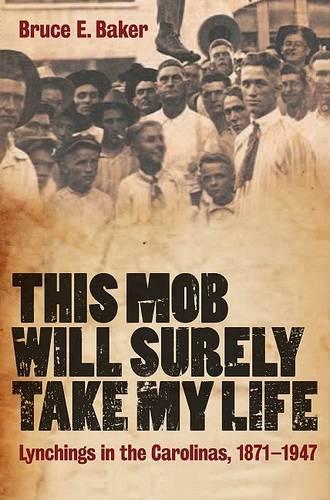
This Mob Will Surely Take My Life: Lynchings in the Carolinas, 1871-1947
(Hardback)
Publishing Details
This Mob Will Surely Take My Life: Lynchings in the Carolinas, 1871-1947
By (Author) Bruce E. Baker
Bloomsbury Publishing PLC
Hambledon Continuum
15th January 2009
United Kingdom
Classifications
Professional and Scholarly
Non Fiction
Violence and abuse in society
Ethnic studies / Ethnicity
History of the Americas
Violence, intolerance and persecution in history
364.134
Physical Properties
Hardback
256
Width 156mm, Height 234mm
Description
This book traces the history of mob violence in North and South Carolina, probing the origins of a phenomenon that has left an open wound in the American psyche. Lynching marked the violent outer boundaries of race and class relations in the American South between Reconstruction and the civil rights era. Everyday interactions could easily escalate into mob violence and did so thousands of times. Bruce E. Baker examines this important aspect of American history by studying seven lynchings in North and South Carolina and looking behind the superficial accounts and explanations provided at the time to explain the deeper causes and wider contexts of these events. Many studies of lynching begin only after Reconstruction had ended and African- Americans found themselves with little political power. This Mob Will Surely Take My Life, however, provides the most thorough study yet written of the Ku Klux Klan's most violent episode - the killing of thirteen black militia members in Union, South Carolina, in 1871- to argue that this act of mob violence set the stage in important ways for the entire lynching era. Enmities born in Reconstruction lingered afterwards and lay behind an 1887 lynching in York County, South Carolina. As lynching became an unsurprising part of life in the South, African-Americans even found that they could use it themselves, in one case to punish a child's killer and in another to settle a church's factional squabbles. The book ends with a discussion of the varied forces that opposed lynching and how, by the 1930s, they had begun to be effective.
Reviews
Mention -Book News, February 2009
"By focusing on seven discreet incidents Baker makes the pattern of lynching in one part of the American South concrete and grounded in the social world that black and white southerners fashioned together. In this light, This Mob Will Surely Take My Life becomes a good starting point for an assessment of the relationship of mob violence to racial politics in the postemancipation South and North Carolina."-The Journal of American History, Dennis B. Downey, Millersville University, Millersville, PA
This Mob Will Surely Take My Life is a major addition to the literature on collective violence in the post-Civil War South. Through these well-researched case studies, the author succeeds in tracing the rise and decline of lynch law in the Carolinas, proving in the process how its persistence and pervasiveness negatively affected both races and all levels of society for more than three-quarters of a century. -- Christopher C. Meyers, Valdosta State University * The South Carolina Historical Magazine *
Author Bio
Bruce E. Baker is Lecturer in American History at Newcastle University, UK. He is author of What Reconstruction Meant: Historical Memory in the American South and After Slavery: Race, Labor and Citizenship in the Reconstruction South.
